Module 12 Unit 3 Language in use 课件(共35张PPT) 2023-2024学年外研版英语七年级下册
文档属性
| 名称 | Module 12 Unit 3 Language in use 课件(共35张PPT) 2023-2024学年外研版英语七年级下册 |
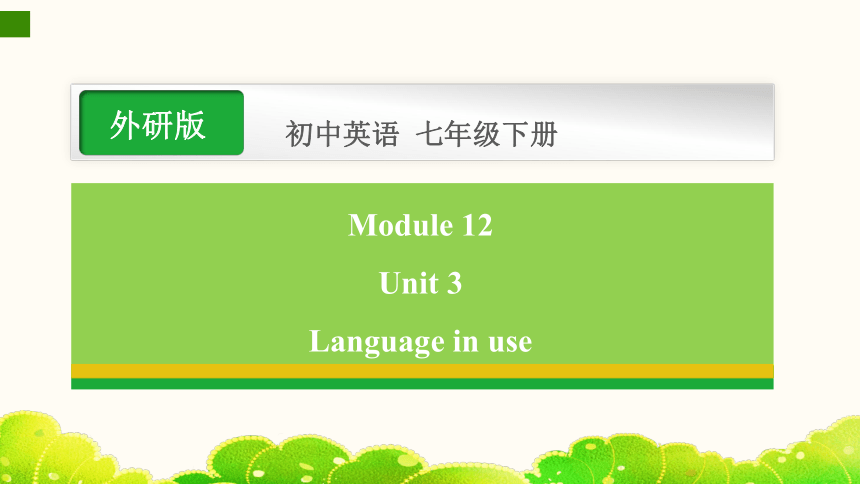
|
|
| 格式 | pptx | ||
| 文件大小 | 8.6MB | ||
| 资源类型 | 教案 | ||
| 版本资源 | 外研版 | ||
| 科目 | 英语 | ||
| 更新时间 | 2024-01-23 00:00:00 | ||
图片预览


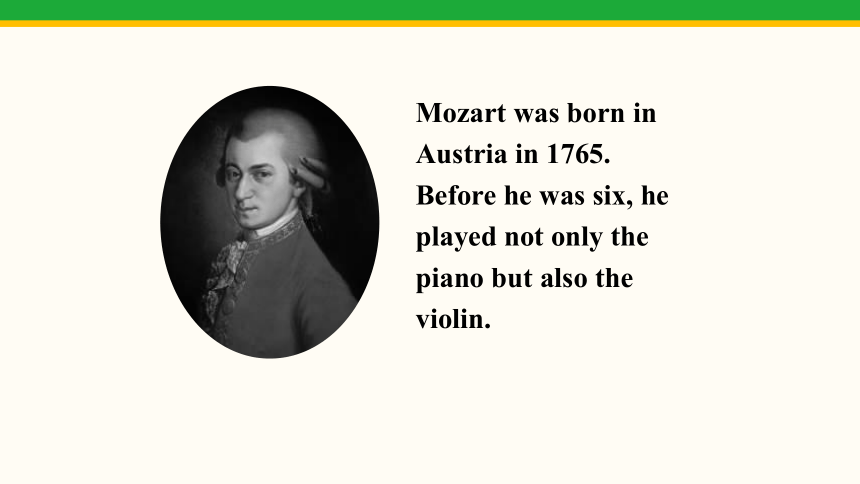
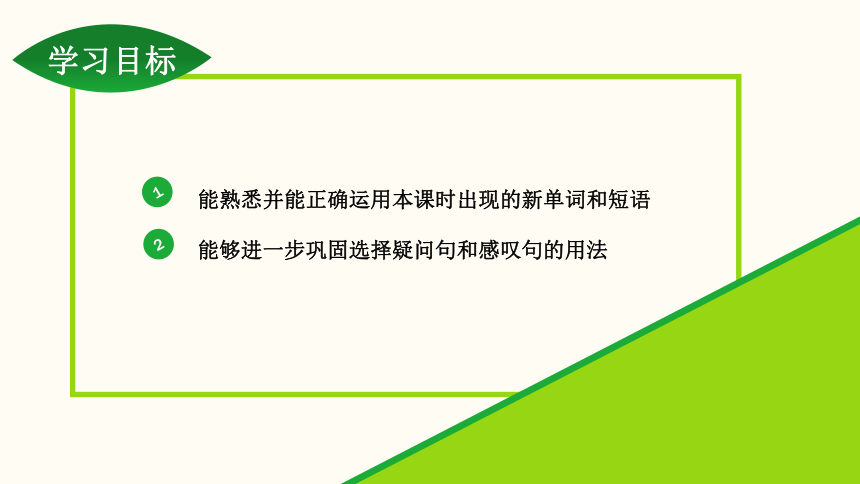
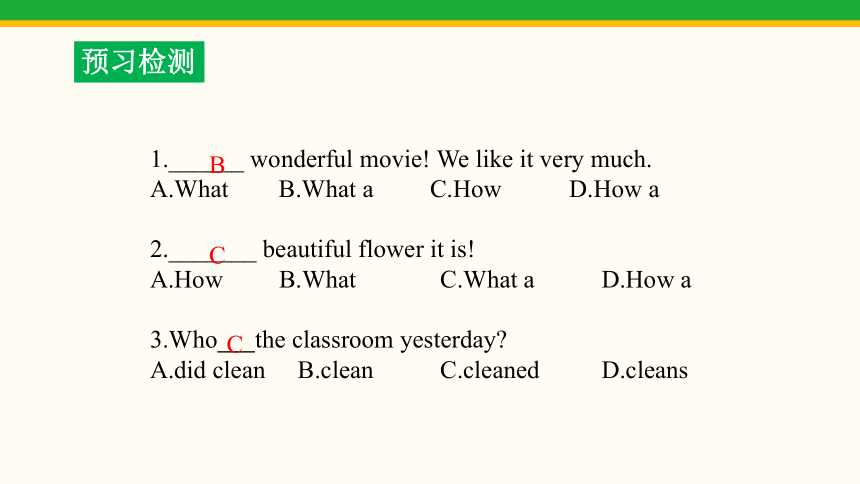
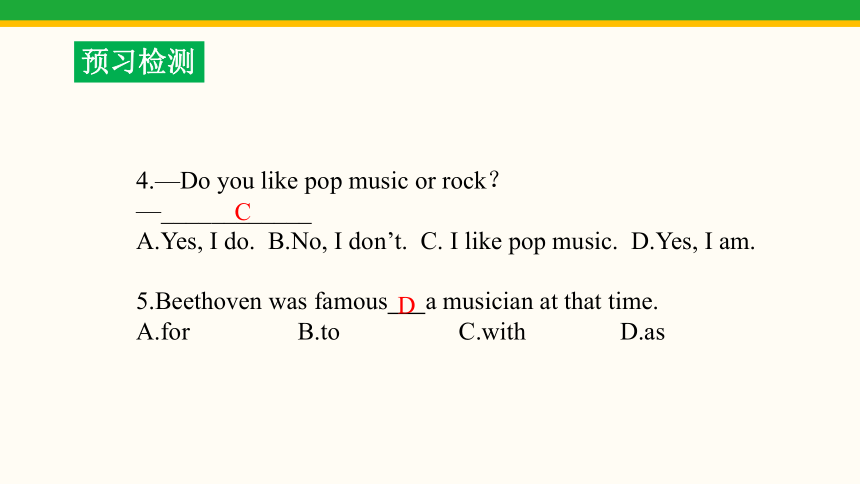
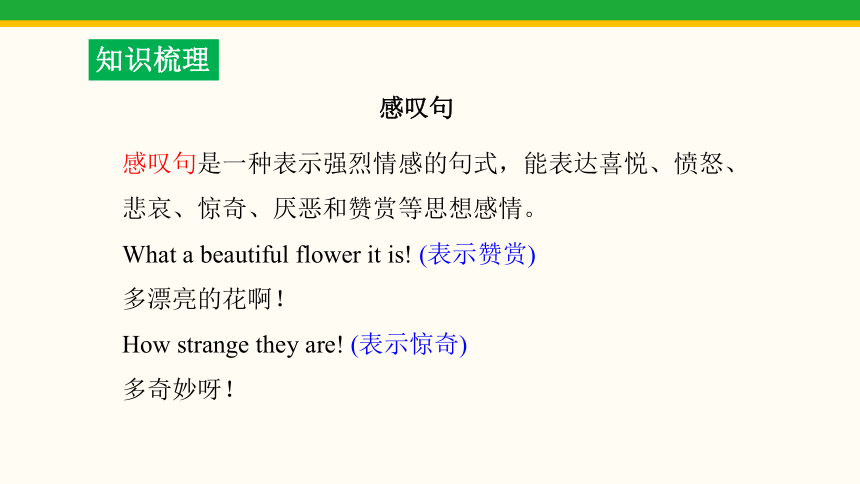
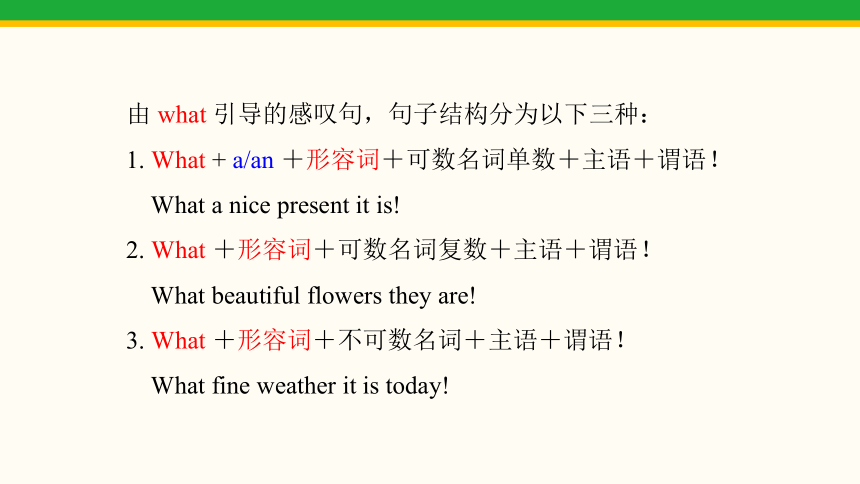
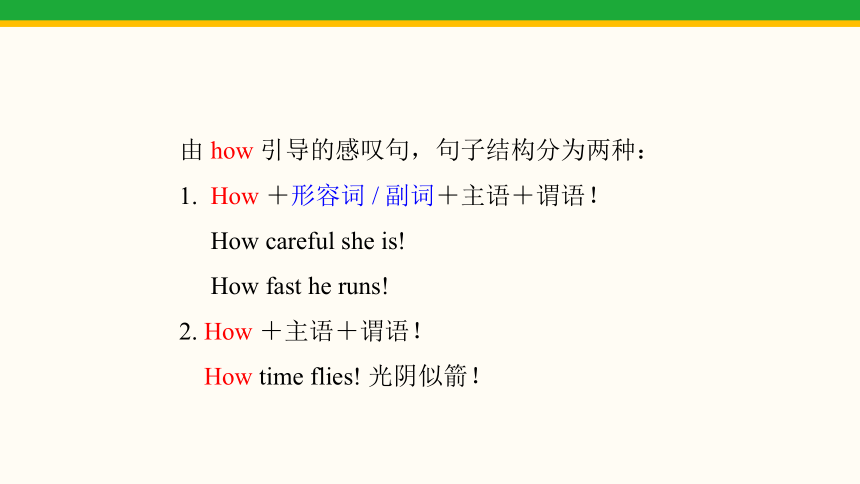

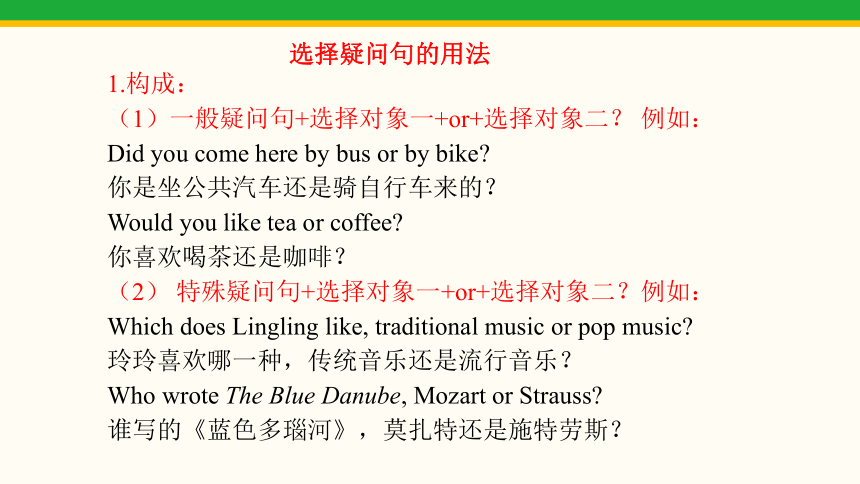
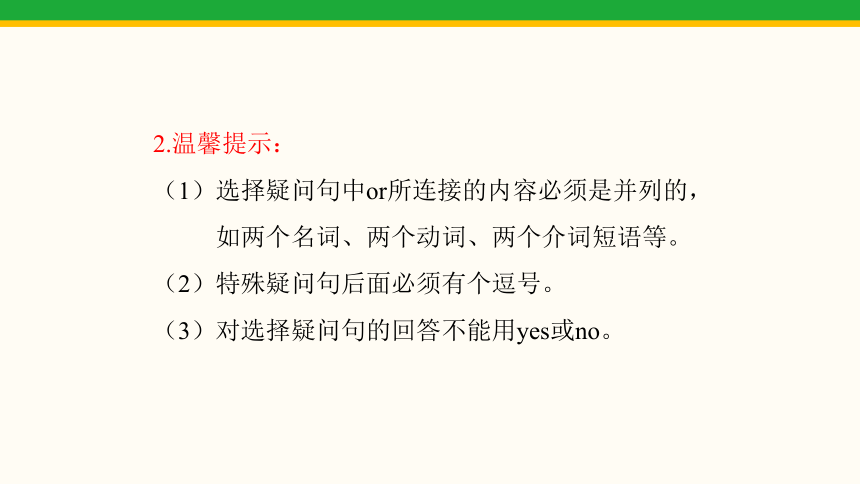
文档简介
(共35张PPT)
外研版
初中英语 七年级下册
Module 12
Unit 3
Language in use
新课导入
Johann Strauss the elder, wrote and played music for traditional dances, called the waltz.
Revision
Mozart was born in Austria in 1765. Before he was six, he played not only the piano but also the violin.
1
2
能熟悉并能正确运用本课时出现的新单词和短语
能够进一步巩固选择疑问句和感叹句的用法
预习检测
1.______ wonderful movie! We like it very much.
A.What B.What a C.How D.How a
2._______ beautiful flower it is!
A.How B.What C.What a D.How a
3.Who the classroom yesterday
A.did clean B.clean C.cleaned D.cleans
B
C
C
预习检测
4.—Do you like pop music or rock?
—____________
A.Yes, I do. B.No, I don’t. C. I like pop music. D.Yes, I am.
5.Beethoven was famous a musician at that time.
A.for B.to C.with D.as
C
D
知识梳理
感叹句是一种表示强烈情感的句式,能表达喜悦、愤怒、悲哀、惊奇、厌恶和赞赏等思想感情。
What a beautiful flower it is! (表示赞赏)
多漂亮的花啊!
How strange they are! (表示惊奇)
多奇妙呀!
感叹句
由 what 引导的感叹句,句子结构分为以下三种:
1. What + a/an +形容词+可数名词单数+主语+谓语!
What a nice present it is!
2. What +形容词+可数名词复数+主语+谓语!
What beautiful flowers they are!
3. What +形容词+不可数名词+主语+谓语!
What fine weather it is today!
由 how 引导的感叹句,句子结构分为两种:
1. How +形容词 / 副词+主语+谓语!
How careful she is!
How fast he runs!
2. How +主语+谓语!
How time flies! 光阴似箭!
感叹词(以及副词、形容词)表示的感叹句:
Oh!啊!哦!哎哟!
Well!好啦!
Why!什么(话)!嗯!岂有此理!好好!
Excellent!好极了!
短语表示的感叹句:
Dear me!哎呀!
Great Heavens!天哪!
带有强烈感情的语调说出的陈述句、疑问句和祈使句变成的感叹句(书面语,句末用感叹号):
Don’t you say that again!
你可不要再说那个了!
Happy birthday, Tony!
生日快乐,托尼!
I am so angry!
我太生气了!
Could one have believed it!
谁肯相信这个!
感叹句的其他形式
1.构成:
(1)一般疑问句+选择对象一+or+选择对象二? 例如:
Did you come here by bus or by bike
你是坐公共汽车还是骑自行车来的?
Would you like tea or coffee
你喜欢喝茶还是咖啡?
(2) 特殊疑问句+选择对象一+or+选择对象二?例如:
Which does Lingling like, traditional music or pop music
玲玲喜欢哪一种,传统音乐还是流行音乐?
Who wrote The Blue Danube, Mozart or Strauss
谁写的《蓝色多瑙河》,莫扎特还是施特劳斯?
选择疑问句的用法
2.温馨提示:
(1)选择疑问句中or所连接的内容必须是并列的,
如两个名词、两个动词、两个介词短语等。
(2)特殊疑问句后面必须有个逗号。
(3)对选择疑问句的回答不能用yes或no。
—Is this by Strauss or Mozart (连接两个名词)
这是施特劳斯写的还是莫扎特写的?
—It’s by Strauss. 是施特劳斯写的。
—Do you like traditional Western music or pop music (连接两个名词短语)
你喜欢西方传统音乐还是流行音乐?
—Well, I like both. 噢,我两者都喜欢。
Should I call or email you (连接两个动词)
我应该给你打电话还是发电子邮件?
Did you come here by bus or by car (连接两个介词短语)
你是坐公交车还是开车过来的?
在回答选择疑问句的时候,除了可以使用选择成分
作答之外,还可以根据实际情况作答,如both或neither。
—Would you like some tea or coffee
你想要一些茶还是咖啡?
—Neither. I'd like some juice.
都不要。我想要一些果汁。
巧记选择疑问句用法
选择疑问很特别,选择部分or连接。
一般、特殊两结构,前升后降调真切。
进一步巩固选择疑问句和感叹句的用法
What a beautiful city!
多美丽的城市啊!
Do you like traditional Western music or pop music
你喜欢传统西方音乐还是流行音乐?
Language practice
观察例句,总结选择疑问句的用法
选择疑问句:
一般疑问句 + A + or + B
特殊疑问句 + A + or + B
E.g.: ——Where can we hear rock music, in New York
or in London
——We can hear rock in New York.
___连接的是_____内容
or
并列
you / like/pop/traditional music
Do you like pop or traditional music
1. Write questions.
1. (be) / Strauss / German / Austrian
2. (be) / this / pop / rock
3. they / play / traditional music / modern music
4. he / play / piano / violin
5. where / (can) we / hear / rock music / in / New York / London
1. (be) / Strauss / German / Austrian
2. (be) / this / pop / rock
Is Strauss German or Austrian
Is this pop or rock
3. They / play / traditional music / modern music
4. He / play / piano / violin
5. Where / (can) we / hear / rock music / in / New York / London
Do they play traditional music or modern music
Does he play the piano or the violin
Where can we hear rock music, in New York or in London
S1:Do you like pop music or rock music
S2:I like pop music.
S1:Is he a teacher or a worker
S2:He is a teacher.
S1:Does he play the piano or the violin
S2:He plays the piano.
Pair work
2. Write exclamations with What(a)... !
This is beautiful music.
What beautiful music this is!
1.Vienna is a beautiful old city.
2.It is a successful concert.
3.They are playing noisy drums.
4.It was a wonderful party.
5.Mozart is a famous composer.
4. It was a wonderful party.
5. Mozart is a famous composer.
What a wonderful party it was!
What a famous composer Mozart is!
Vienna is a beautiful old city.
2. It is a successful concert.
3. They are playing noisy drums.
What a beautiful old city Vienna is!
What a successful concert it is!
What noisy drums they are playing!
观察并总结选择感叹句的用法
what 引导的感叹句:
What + a/an +形容词+单数可数名词+(主语+谓语)!
What +形容词+复数可数名词 + 主语+谓语!
What +形容词+ 不可数名词+ 主语+谓语!
how 引导的感叹句:
How +形容词/副词+主语+谓语!
How +主语+谓语!
Lingling:This is beautiful music. Who wrote it, Betty
Betty:Beethoven wrote it. He was a great musician.
I (1)______his music.
Lingling:Me too. Did he live at the same time as Mozart
Betty:Yes, he was born in 1770 and began to
(2)_______music at an early age. He (3)________
his first piano concert when he was only seven.
4. Complete the conversation with the correct form of the words.
come give hear learn love write
love
learn
gave
Lingling:When did he start to (4)________music
Betty:Very early. His first work (5)________ out before the
age of thirteen.
Lingling:Was Beethoven famous at that time
Betty:Yes. But he began to lose his hearing. In the last ten
years of Beethoven's life, he(6) ________nothing.
Lingling:That's sad!
Betty:Yes, but he still played the piano. He died when
he was fifty-six.
come give hear learn love write
write
came
heard
通过以
活动小结
通过以上的活动,我们可以了解到,在问题中提供两个或者两个以上可选答案的问句叫做1._______________。可供选择的答案之间由2._____ 连接起来,意思是“或者”,不能用3. 或者4. 来回答。感叹句通常由5._____和6.____来引导,表达惊异、喜悦、愤怒、气愤等思想感情。
选择疑问句
or
Yes
No
what
how
探究二
谈论中国的音乐
你能说出这些乐器的名称吗?
二胡
琵琶
唢呐
鼓
Let's enjoy a music!
猜一猜这是什么乐器演奏的?
笛子
中国传统音乐包括哪些?
戏曲
民歌
曲艺
3. Put the words and expression into the correct column.
drum fan musician piano pop rock traditional music violin
pop rock
traditional music
Types of music Instruments People
drum piano
violin
fan
musician
beautiful fast lively modern sad slow
Module task: Talking about Chinese music
5. Work in pairs. Talk about one or two types of Chinese music.
Choose one or two types of Chinese music and describe them. Use the words from the box.
Say which types of music you like. Give your reasons.
Now talk about Chinese music in front of the class.
Guzheng is a traditional Chinese instrument. More and more people start to play it…
通过以上的活动,我们通过以上的活动,我们可以了解到,“10年之后”可以表达为1. ;“你的学校将会是什么样的”可以通过以上的活动,我们可以了解到,“10年之后”可以表达为1. ;“你的学校将会是什么样的”可以说成2. ;“将来的学校会不同吗?”可以表达为3. 。说成2. ;“将来的学校会不同吗?”可以表达为3. 。可以了解到,“10年之后”可以表达为1. ;“你的学校将会是什么样的”可以说成2. ;“将来的学校会不同吗?”可以表达为3. 。
活动小结
通过以上活动,我们可以知道,中国的传统乐器包含1. ,2. ,3. , 4. 等,中国的传统音乐包含5. ,6. ,7. 等。
二胡
琵琶
唢呐
鼓
戏曲
民歌
曲艺
当堂检测
一、把下列句子改写成感叹句。
1. It is quite a nice present.
_____ _____ nice present (it is)!
2. They are good students.
_____ _____ students they are!
3. It’s sunny today.
_____ _ sunny day it is today!
4. The children are lovely.
_____ _____ children!
What a
What good
What a
What lovely
二、翻译下列句子。
1. 你在几年级,三年级还是四年级?
Which grade are you in, Grade 3 or Grade 4
2. 你的玩具车是新的还是旧的?
Is your toy car new or old
3. 你的父母现在在超市还是在家?
Are your parents in the shop or at home now
4. 你说中文还是说英语?
Do you speak English or Chinese
5. 你想喝些什么,可乐还是牛奶?
What would you like to drink, coke or milk
选择疑问句和感叹句的用法
重点单词:sad, pop, traditional, modern, rock, famous, classical, beautiful, slow, lively, fast
重点短语:a famous composer, play noise drums, a successful concert, at the same time as...
Module 12
Unit 3
谈论中国的音乐
外研版
初中英语 七年级下册
Module 12
Unit 3
Language in use
新课导入
Johann Strauss the elder, wrote and played music for traditional dances, called the waltz.
Revision
Mozart was born in Austria in 1765. Before he was six, he played not only the piano but also the violin.
1
2
能熟悉并能正确运用本课时出现的新单词和短语
能够进一步巩固选择疑问句和感叹句的用法
预习检测
1.______ wonderful movie! We like it very much.
A.What B.What a C.How D.How a
2._______ beautiful flower it is!
A.How B.What C.What a D.How a
3.Who the classroom yesterday
A.did clean B.clean C.cleaned D.cleans
B
C
C
预习检测
4.—Do you like pop music or rock?
—____________
A.Yes, I do. B.No, I don’t. C. I like pop music. D.Yes, I am.
5.Beethoven was famous a musician at that time.
A.for B.to C.with D.as
C
D
知识梳理
感叹句是一种表示强烈情感的句式,能表达喜悦、愤怒、悲哀、惊奇、厌恶和赞赏等思想感情。
What a beautiful flower it is! (表示赞赏)
多漂亮的花啊!
How strange they are! (表示惊奇)
多奇妙呀!
感叹句
由 what 引导的感叹句,句子结构分为以下三种:
1. What + a/an +形容词+可数名词单数+主语+谓语!
What a nice present it is!
2. What +形容词+可数名词复数+主语+谓语!
What beautiful flowers they are!
3. What +形容词+不可数名词+主语+谓语!
What fine weather it is today!
由 how 引导的感叹句,句子结构分为两种:
1. How +形容词 / 副词+主语+谓语!
How careful she is!
How fast he runs!
2. How +主语+谓语!
How time flies! 光阴似箭!
感叹词(以及副词、形容词)表示的感叹句:
Oh!啊!哦!哎哟!
Well!好啦!
Why!什么(话)!嗯!岂有此理!好好!
Excellent!好极了!
短语表示的感叹句:
Dear me!哎呀!
Great Heavens!天哪!
带有强烈感情的语调说出的陈述句、疑问句和祈使句变成的感叹句(书面语,句末用感叹号):
Don’t you say that again!
你可不要再说那个了!
Happy birthday, Tony!
生日快乐,托尼!
I am so angry!
我太生气了!
Could one have believed it!
谁肯相信这个!
感叹句的其他形式
1.构成:
(1)一般疑问句+选择对象一+or+选择对象二? 例如:
Did you come here by bus or by bike
你是坐公共汽车还是骑自行车来的?
Would you like tea or coffee
你喜欢喝茶还是咖啡?
(2) 特殊疑问句+选择对象一+or+选择对象二?例如:
Which does Lingling like, traditional music or pop music
玲玲喜欢哪一种,传统音乐还是流行音乐?
Who wrote The Blue Danube, Mozart or Strauss
谁写的《蓝色多瑙河》,莫扎特还是施特劳斯?
选择疑问句的用法
2.温馨提示:
(1)选择疑问句中or所连接的内容必须是并列的,
如两个名词、两个动词、两个介词短语等。
(2)特殊疑问句后面必须有个逗号。
(3)对选择疑问句的回答不能用yes或no。
—Is this by Strauss or Mozart (连接两个名词)
这是施特劳斯写的还是莫扎特写的?
—It’s by Strauss. 是施特劳斯写的。
—Do you like traditional Western music or pop music (连接两个名词短语)
你喜欢西方传统音乐还是流行音乐?
—Well, I like both. 噢,我两者都喜欢。
Should I call or email you (连接两个动词)
我应该给你打电话还是发电子邮件?
Did you come here by bus or by car (连接两个介词短语)
你是坐公交车还是开车过来的?
在回答选择疑问句的时候,除了可以使用选择成分
作答之外,还可以根据实际情况作答,如both或neither。
—Would you like some tea or coffee
你想要一些茶还是咖啡?
—Neither. I'd like some juice.
都不要。我想要一些果汁。
巧记选择疑问句用法
选择疑问很特别,选择部分or连接。
一般、特殊两结构,前升后降调真切。
进一步巩固选择疑问句和感叹句的用法
What a beautiful city!
多美丽的城市啊!
Do you like traditional Western music or pop music
你喜欢传统西方音乐还是流行音乐?
Language practice
观察例句,总结选择疑问句的用法
选择疑问句:
一般疑问句 + A + or + B
特殊疑问句 + A + or + B
E.g.: ——Where can we hear rock music, in New York
or in London
——We can hear rock in New York.
___连接的是_____内容
or
并列
you / like/pop/traditional music
Do you like pop or traditional music
1. Write questions.
1. (be) / Strauss / German / Austrian
2. (be) / this / pop / rock
3. they / play / traditional music / modern music
4. he / play / piano / violin
5. where / (can) we / hear / rock music / in / New York / London
1. (be) / Strauss / German / Austrian
2. (be) / this / pop / rock
Is Strauss German or Austrian
Is this pop or rock
3. They / play / traditional music / modern music
4. He / play / piano / violin
5. Where / (can) we / hear / rock music / in / New York / London
Do they play traditional music or modern music
Does he play the piano or the violin
Where can we hear rock music, in New York or in London
S1:Do you like pop music or rock music
S2:I like pop music.
S1:Is he a teacher or a worker
S2:He is a teacher.
S1:Does he play the piano or the violin
S2:He plays the piano.
Pair work
2. Write exclamations with What(a)... !
This is beautiful music.
What beautiful music this is!
1.Vienna is a beautiful old city.
2.It is a successful concert.
3.They are playing noisy drums.
4.It was a wonderful party.
5.Mozart is a famous composer.
4. It was a wonderful party.
5. Mozart is a famous composer.
What a wonderful party it was!
What a famous composer Mozart is!
Vienna is a beautiful old city.
2. It is a successful concert.
3. They are playing noisy drums.
What a beautiful old city Vienna is!
What a successful concert it is!
What noisy drums they are playing!
观察并总结选择感叹句的用法
what 引导的感叹句:
What + a/an +形容词+单数可数名词+(主语+谓语)!
What +形容词+复数可数名词 + 主语+谓语!
What +形容词+ 不可数名词+ 主语+谓语!
how 引导的感叹句:
How +形容词/副词+主语+谓语!
How +主语+谓语!
Lingling:This is beautiful music. Who wrote it, Betty
Betty:Beethoven wrote it. He was a great musician.
I (1)______his music.
Lingling:Me too. Did he live at the same time as Mozart
Betty:Yes, he was born in 1770 and began to
(2)_______music at an early age. He (3)________
his first piano concert when he was only seven.
4. Complete the conversation with the correct form of the words.
come give hear learn love write
love
learn
gave
Lingling:When did he start to (4)________music
Betty:Very early. His first work (5)________ out before the
age of thirteen.
Lingling:Was Beethoven famous at that time
Betty:Yes. But he began to lose his hearing. In the last ten
years of Beethoven's life, he(6) ________nothing.
Lingling:That's sad!
Betty:Yes, but he still played the piano. He died when
he was fifty-six.
come give hear learn love write
write
came
heard
通过以
活动小结
通过以上的活动,我们可以了解到,在问题中提供两个或者两个以上可选答案的问句叫做1._______________。可供选择的答案之间由2._____ 连接起来,意思是“或者”,不能用3. 或者4. 来回答。感叹句通常由5._____和6.____来引导,表达惊异、喜悦、愤怒、气愤等思想感情。
选择疑问句
or
Yes
No
what
how
探究二
谈论中国的音乐
你能说出这些乐器的名称吗?
二胡
琵琶
唢呐
鼓
Let's enjoy a music!
猜一猜这是什么乐器演奏的?
笛子
中国传统音乐包括哪些?
戏曲
民歌
曲艺
3. Put the words and expression into the correct column.
drum fan musician piano pop rock traditional music violin
pop rock
traditional music
Types of music Instruments People
drum piano
violin
fan
musician
beautiful fast lively modern sad slow
Module task: Talking about Chinese music
5. Work in pairs. Talk about one or two types of Chinese music.
Choose one or two types of Chinese music and describe them. Use the words from the box.
Say which types of music you like. Give your reasons.
Now talk about Chinese music in front of the class.
Guzheng is a traditional Chinese instrument. More and more people start to play it…
通过以上的活动,我们通过以上的活动,我们可以了解到,“10年之后”可以表达为1. ;“你的学校将会是什么样的”可以通过以上的活动,我们可以了解到,“10年之后”可以表达为1. ;“你的学校将会是什么样的”可以说成2. ;“将来的学校会不同吗?”可以表达为3. 。说成2. ;“将来的学校会不同吗?”可以表达为3. 。可以了解到,“10年之后”可以表达为1. ;“你的学校将会是什么样的”可以说成2. ;“将来的学校会不同吗?”可以表达为3. 。
活动小结
通过以上活动,我们可以知道,中国的传统乐器包含1. ,2. ,3. , 4. 等,中国的传统音乐包含5. ,6. ,7. 等。
二胡
琵琶
唢呐
鼓
戏曲
民歌
曲艺
当堂检测
一、把下列句子改写成感叹句。
1. It is quite a nice present.
_____ _____ nice present (it is)!
2. They are good students.
_____ _____ students they are!
3. It’s sunny today.
_____ _ sunny day it is today!
4. The children are lovely.
_____ _____ children!
What a
What good
What a
What lovely
二、翻译下列句子。
1. 你在几年级,三年级还是四年级?
Which grade are you in, Grade 3 or Grade 4
2. 你的玩具车是新的还是旧的?
Is your toy car new or old
3. 你的父母现在在超市还是在家?
Are your parents in the shop or at home now
4. 你说中文还是说英语?
Do you speak English or Chinese
5. 你想喝些什么,可乐还是牛奶?
What would you like to drink, coke or milk
选择疑问句和感叹句的用法
重点单词:sad, pop, traditional, modern, rock, famous, classical, beautiful, slow, lively, fast
重点短语:a famous composer, play noise drums, a successful concert, at the same time as...
Module 12
Unit 3
谈论中国的音乐
同课章节目录
- Module 1 Lost and found
- Unit 1 Whose bag is this?
- Unit 2 Are they yours?
- Unit 3 Language in use
- Module 2 What can you do ?
- Unit 1 I can play the piano
- Unit 2 I can run really fast
- Unit 3 Language in use
- Module 3 Making plans
- Unit 1 What are you going to do at the weekends?
- Unit 2 We're going to cheer the players.
- Unit 3 Language in use
- Module 4 Life in the future
- Unit 1 Everyone will study at home
- Unit 2 Every family will have a small plane.
- Unit 3 Language in use
- Module 5 Shopping
- Unit 1 What can I do for you?
- Unit 2 You can buy everything on the Internet
- Unit 3 Language in use
- Module 6 Around town
- Unit 1 Could you tell me how to get to the Nationa
- Unit 2 The London Eye is on your right.
- Unit 3 Language in use
- Revision module A
- Module 7 My past life
- Unit 1 I was born in a small village.
- Unit 2 I was born in Quincy.
- Unit 3 Language in use
- Module 8 Story time
- Unit 1 Once upon a time….
- Unit 2 Goldilocks hurried out of the house.
- Unit 3 Language in use
- Module 9 Life history
- Unit 1 He left school and began work at the age of
- Unit 2 He decided to be an actor.
- Unit 3 Language in use
- Module 10 A holiday journey
- Unit 1 What did you do?
- Unit 2 This morning we took a walk.
- Unit 3 Language in use
- Module 11 Body language
- Unit 1 They touch noses!
- Unit 2 Here are some ways to welcome them.
- Unit 3 Language in use
- Module 12 Western music
- Unit 1 It's so beautiful!
- Unit 2 Vienna is the centre of European classical
- Unit 3 Language in use
- Revision module B
